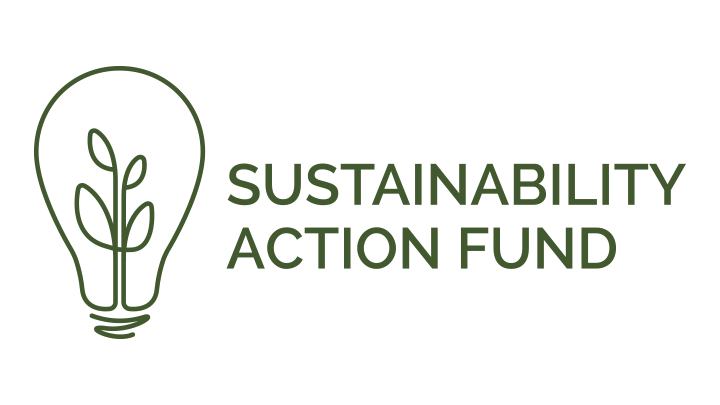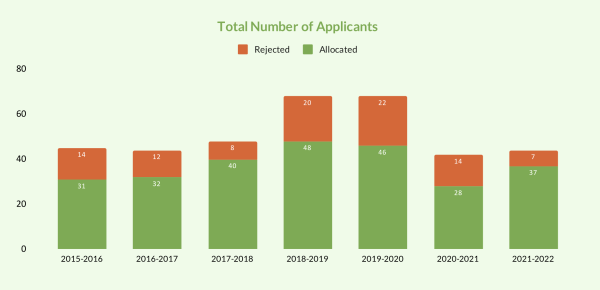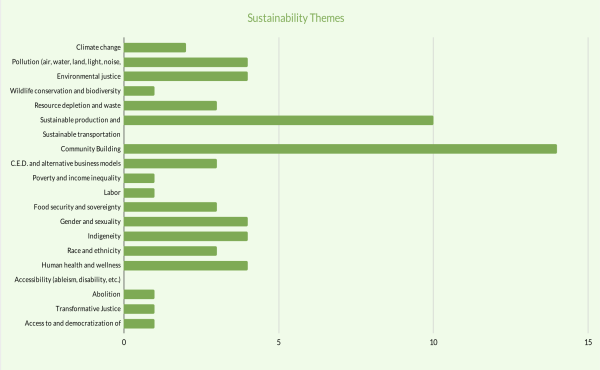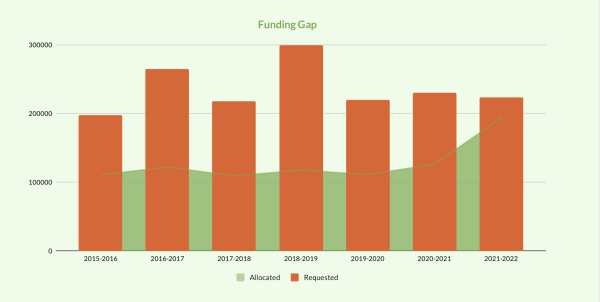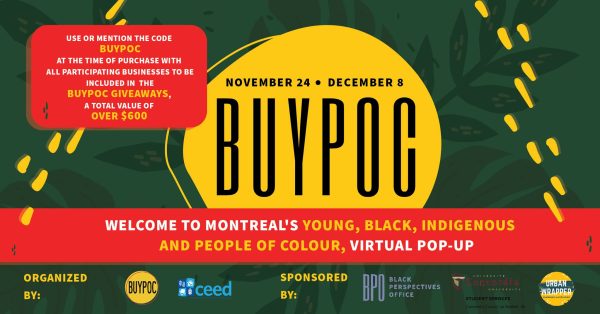Fall 2021 - Winter 2022 In Review
In the 2021-2022 Academic Year, we funded 37 projects a total of $193,672.95
This metric shows how much from the total allocated funding, $193,672.95 was given to each sustainability theme recognized by the SAF. It should be noted that Education & Research projects often fill in sustainability gaps in Concordia student's curriculum.
These past two years, we we have seen a particularly large uptick in students taking on projects of social sustainability. This year, projects based on Community Building have been the most prominent as opposed to last year, being Race & Ethnicity projects.
This metric is typical and consistent in terms of total funding allocated per faculty. It suggests that students in Business have been less likely to take on projects of sustainability, and students of Arts & Science to be the most likely.
This metric shows the funding gap, between how much funding was allocated to projects compared to the total that they requested from us. As you can see we have been working towards decreasing this gap.
Dear Future Projects...
“Dear future projects: Always have a contingency plan. Life works in unexpected ways. Never rush, go slow, but plan your route and work hard to get where you want to go.”
“This project was organized and held entirely online, which was a first time for us. Even if our screens were holding us apart from each other physically, we still found pros to organizing a successful online event and found alternative ways to get people to interact with our exhibition outside of the realm of the university by reaching out to various local businesses that helped us promote our event. An advice for future projects that might have to organize online events is find out of the box alternatives to make your event as immersive as you can. “
“We would recommend looking into the changing policies for online promotion on social media platforms. Recently, Facebook has black-listed many topics related to politically contentious issues. Unfortunately, this resulted in our application for facebook promotions being denied twice due to its connections with recent social movements on racial injustice.”
” One lesson we learned related to the project management of our exhibition was to eliminate as many uncertainties as possible, as early as possible – especially when you have limited time and funding. During the summer of 2020, our team was conceptualizing our exhibition as a hybrid in-person and virtual event. Given the worsening situation with COVID, by August our team decided that we would shift entirely virtually since health restrictions were constantly changing. By deciding to go virtual early, the team was able to refocus our limited time and resources on what we knew we could make happen regardless of restrictions, rather than struggling to make the project fit to the changing scenario. Looking back, if we were committed to doing things in person, we would have wasted a lot of time planning and re-planning, and in the end, we might not have had an exhibition at all. “
“Schedule time to breath in your timeline, congratulate team members on the little and big tasks completed, keep track of feedback as it will fuel you through the lows and highs, and when your project is aligned with your passion, fear and indecision seem a lot less important!
“Through the FASA x SAF Anti-Oppression Coordinator Pilot Project, we have learned that it is possible to accomplish a lot in a short amount of time, and that by working collectively it is possible to make real changes in our organization. At this point, we have hired two short-term Anti-Oppression coordinators, who are working hard to make this project a recurring position at FASA. Now that the coordinators are hired, there are four main focuses of the project: (1) putting on 2 speaker events by BIPOC artists at the end of May for fine arts students to attend, (2) writing a proposal to the FASA Board of Directors for a permanent Anti-Oppression coordinator, who would be hired and trained at the end of the current pilot project, (3) the creation of a watchdog organization called the Anti-oppression and Intersectionality in Fine Arts (AIFA) that would be composed of a 5 person committee and would exist under the FASA umbrella, and (4) the creation of a FASA BIPOC bursary program to award bursaries to applicants who fill out a detailed questionnaire that will help us better understand the needs of the BIPOC student community. “
“In doing solidarity actions, it is very important to get consent and direction from leaders of the movement you are engaging in. From the beginning of this project we reached out to Canadian Alliance for Sex Work Law Reform and Consulted with Francine Tremblay, both have a history of involvement in the movement to decriminalize sex work. Consultation is an integral part of solidarity action. We had media interest in the campaign but, in the end no article was published. In the future I would recommend preparing an Op-ed and sending it to local and student newspapers.”
“ The biggest challenge I faced during this project was staying organized and effectively working with other artists. With a film that has a medium sized budget, keeping track of grants and department progress while simultaneously directing actors was a bit of a challenge but I also learned more about myself and how I like to work. Working with so many different artists can be difficult but I tried to keep my vision at the forefront so it was not drowned out by different opinions. My biggest advice would be to stay true to yourself and your artistic process but also be open to working with those who are in and outside of your field! “

